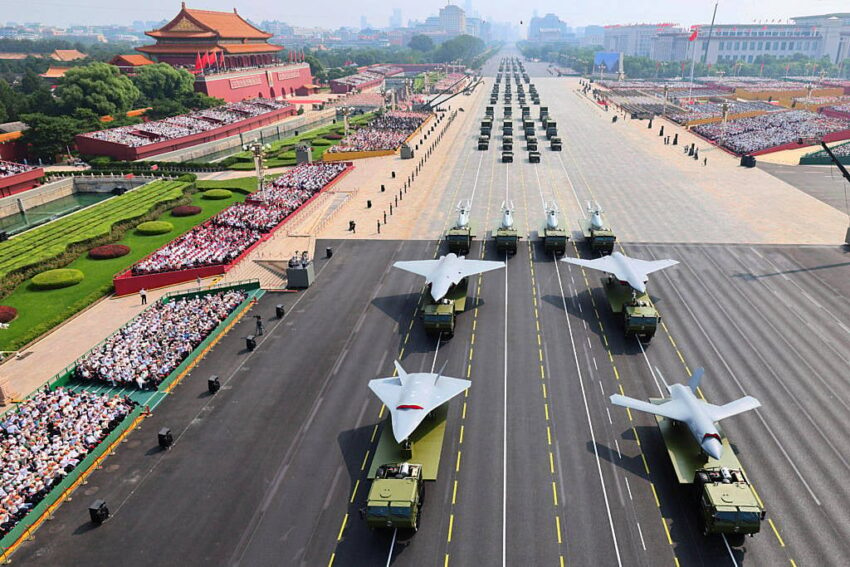Russia is selling military equipment and technology to China that could help Beijing prepare for an airborne invasion of Taiwan, according to an analysis of leaked Russian documents by a London think tank.
The authors of the analysis at the Royal United Services Institute (RUSI) in London obtained around 800 pages of documents, including contracts and lists of equipment to be supplied by Moscow to Beijing, from the Black Moon hacktivist group. The group, which previously published some of the documents online, does not identify its members but describes itself in a manifesto as opposed to governments that carry out aggressive foreign policy.
The authors of the RUSI report shared some of the documents with The Associated Press (AP) and say they appear to be genuine, although parts of the documents may have been omitted or altered. AP is unable to independently verify their authenticity.
The mix of completed and apparent draft Russian documents reference meetings between Chinese and Russian delegations, including visits to Moscow, as well as payment and delivery timelines for high-altitude parachute systems and amphibious assault vehicles. They suggest that Russia has begun work on the products to be delivered but do not contain direct evidence from the Chinese side that Beijing has paid any money or received any equipment.
While the authors argue the equipment could be used to invade Taiwan, under President Xi Jinping China has embarked upon a broad modernisation programme of its armed forces with the goal of transforming it into a world-class military by 2050. High-ranking US officials have suggested Mr. Xi ordered his military to be prepared for a possible invasion of Taiwan as early as 2027.
Beijing claims the self-governing democracy is rightfully a part of China and has not ruled out seizing the island by force. The documents do not mention Taiwan directly, but the RUSI analysis suggests the deal would help China gain advanced parachuting capabilities that it would need to mount an invasion, potentially speeding up a timeline.
“It is not certain that China has decided to invade Taiwan, but access to Russian equipment and localised training in China means Beijing will be better equipped for a potential invasion,” said Oleksandr Danylyuk, one of the report’s authors. “The Chinese school of airborne landing is very young,” he added, suggesting Moscow’s assistance could help speed up China’s airborne programme by about 10 to 15 years.
Russia’s Kremlin, as well as China and Taiwan’s defence and foreign ministries, did not immediately respond to requests for comment.
The greatest value of the deal to China is likely to be in the training and procedures for command and control of parachute forces, because Russia has combat experience, whereas China does not, Mr. Danylyuk and fellow analyst Jack Watling wrote.
The analysts say Russia’s aim is to develop as a military supplier to China and fund its war in Ukraine. But Mr. Danylyuk also suggested to AP that Moscow may want to draw Beijing into a conflict with Washington over Taiwan, distracting the US from Russia’s war with Ukraine.
While Beijing’s military capabilities largely surpass Moscow’s, the analysis says China has gaps which Russia can fill. Russia has a long history of airborne forces dating back decades—know-how the authors say China needs.
Song Zhongping, a military commentator in Beijing, said China had superior equipment, but Russia has more combat experience. “Russia and China have their own relative strengths in paratrooping,” Mr. Song said. “They conducted joint air and sea patrols and drills, which indicates they are learning from each other’s strengths to address their own weaknesses.”
According to a document dated September 2024, an initial agreement was reached in April 2021 with timelines for payments and delivery. Stages one and two — analysis of technical specifications, software modifications, and equipment manufacturing — have been completed, according to that document.
Russia also agreed to provide training in China and a complete set of equipment for an airborne battalion, including the ability to carry out infiltration by special forces. The analysis says this includes the sale of 37 light amphibious assault vehicles, 11 amphibious anti-tank self-propelled guns, and 11 airborne armoured personnel carriers, as well as command and observation vehicles.
The total cost is listed as more than 210 million US dollars (157 million).
https://www.breakingnews.ie/world/russia-helping-china-prepare-for-potential-invasion-of-taiwan-says-think-tank-1811384.html
